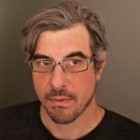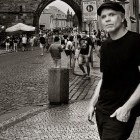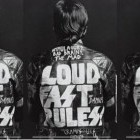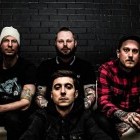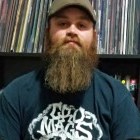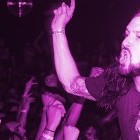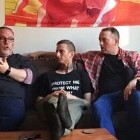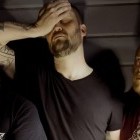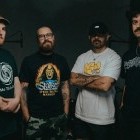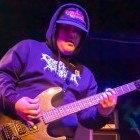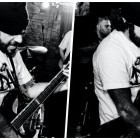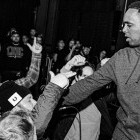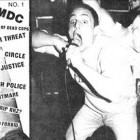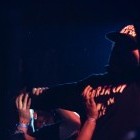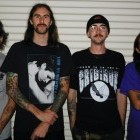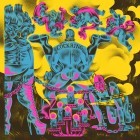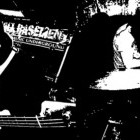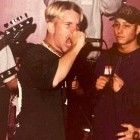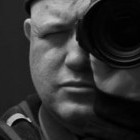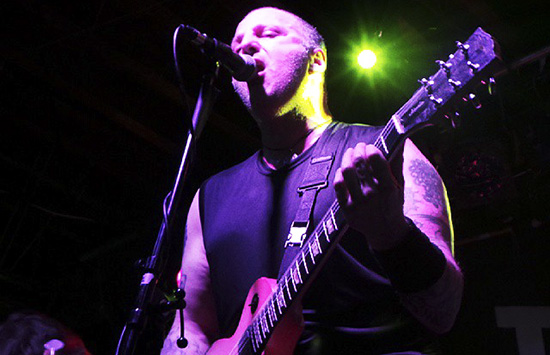
I've always admired Mike Hill's work ethic. When I first met him back in the late '90s, Hill had already amassed quite the impressive musical résumé—spending time in the bands Otis, 454 Big Block, and Anodyne. Since then, the vocalist/guitarist has steered Tombs, a band that pummels you one moment and trips you out the next with textured nuances. Formed in 2007, Tombs have proven to be road dogs, touring throughout the world in support of their three studio albums and three EPs with bands like Pallbearer, 1349, and Pelican.
Hill also keeps busy with Savage Gold Coffee, a business he founded a couple of years back that specializes in high-quality fair-trade beans. Another project that keeps Hill busy is Everything Went Black Media, a website that features a highly entertaining podcast hosted by the Tombs mastermind. With Tombs gearing up for the April 1 release of an excellent EP called All Empires Fall, I reached out to Hill to chat about his various endeavours.
Tell me a bit about your upbringing.
I grew up in a small suburban town called Carmel, New York, about 60 miles north of Manhattan. My parents were both born and raised in the Bronx and moved to that area so they could establish a more favorable environment to raise their family and settle down.
Were they strict?
My mom was strict but my dad was pretty easy-going. It was a very normal, average place to grow up, with a strong middle- and working-class vibe. Most people either commuted into New York City or worked as contractors, owned small businesses, etc. My dad worked at IBM so we were pretty secure. To this day, I have a tight relationship with my parents.
What kind of music did you first get into as a kid, and how and when did you discover punk/hardcore/metal music?
My dad liked music, so I listened to a lot of the stuff he listened to when I was young. Stuff like Elvis Presley, Chuck Berry, and girl groups. I started listening to heavy metal and hard rock through an older brother of one of my friends. It was Rush, Led Zeppelin, Triumph, Judas Priest, and Deep Purple... stuff like that.
I first heard punk and hardcore when this kid named Mike Katz went to California one summer. He came back with the Let Them Eat Jellybeans! compilations. Mike was a sick drummer that was a metal dude, but when he came back from California he was a punk—the hair, leather jacket, earrings... the whole trip. That comp and some dubbed cassettes of Circle Jerks, Bad Brains, and Suicidal Tendencies piqued my interest. I checked out the Repo Man movie and started gravitating away from metal, and my fascination with punk grew.
It wasn't until I heard Black Flag that I really bought into the punk thing. I heard the Henry Rollins stuff first and that cut right to the center of things. It was the bottom line for me. Black Flag was what it was all about. I was always kind of on the outside of things socially, so the music made a lot of sense. I really got into the SST catalog. All the bands were different, weird, and alien to my normal, boring environment. It made me look at the world in a different way. I met this girl who liked punk and goth music and she turned me on to a lot of really cool stuff like X, The Cramps, The Cure, etc.
Tell me about your local scene back when you were in your teens.
There was no scene where I grew up. There were a handful of garage bands that played some parties. It was really nothing to speak of. Mostly, the scene was in Manhattan. This guy named John Ricci was sort of the guitar hero in the little scene we had. He ended up playing with White Zombie on the Make Them Die Slowly record.
I didn't grow up in New York City, so there was literally about eight kids that even knew what punk was. There was a place called Rosemary's Texas Taco where a lot of punk types hung out. It was close to Trash American Style, the mecca for all things underground. Honestly, even in the outsider world of punk, I was still mostly on the outside of things. I hung out on my own a lot in my parents' basement and lifted weights, read comics, listened to music, and sort of dreamt up a game plan to get out into the world.
I saw X at this place called The Ritz in New York City. It made a big impression on me and motivated me to take music seriously. I had some friends that were into NYHC stuff like the Cro-Mags, Warzone, and Agnostic Front. I didn't really like that stuff except for The Age of Quarrel record by the Cro-Mags and Cause for Alarm by Agnostic Front. I liked Cause for Alarm because it sounded like Exodus, sort of.
One of the bands you played in back in the day that I don't know much about is Otis. I have the Electric Landlady album, but I never got to see you live.
I started up that band when I moved to Boston in the mid-'90s. Josh Scott, who would later go on to play bass in Anodyne, was also in that band. Otis was basically a band that worshipped Helmet and the Melvins. I can't say that the band is very listenable by today's standards.
We put out two records: a self-titled one and the aforementioned Electric Landlady. I never liked that title, the singer came up with that. I feel like the title and the graphics sort of haunted us on the touring that surrounded that record. I remember being in Europe on that band's sole European tour and seeing tour posters using hairdryers and all of that cringe-worthy stuff. That was kind of a band playing tight, Helmet-esque riffs with a dude that wanted to sing in Stone Temple Pilots.
Despite all of this, we got out there and did some things. It kind of gave me the taste for the road. Ultimately, it was this dichotomy that broke the band up. I think Josh and I wanted to do more extreme stuff and the singer [Kevomatic L.B.] wanted to be an alternative rock singer.
After Otis, you joined 454 Big Block in time for the Save Me From Myself album tour in 1997. What was the touring like, and why did you break up?
I was friends with the guys in the band. At the time, we were living in a house on Mission Hill. It made sense for me to join. Save Me From Myself was already recorded. It was a great record and 454 Big Block were a great band, but "the scene" had changed. Kids were sort of going more in the PC/emo direction, and the 454 Big Block vibe was a little too intense. The singer [Elgin James] was involved with a local Boston crew, which—looking back—I think hampered the progress of the band, unfortunately. As I said, they were a great band, but the scene couldn't deal with their kind of intensity.
Playing in Big Block made me a better guitar player. Dean Baltulonis is a legit player and I had to up my game to play some of the riffs he wrote. As far as touring with them and playing shows, it was fun hanging out with them, but it was clear to me that the band was starting to fall apart. I think Dean was moving away from playing metallic hardcore. The band sort of morphed into The World is My Fuse, a post-hardcore band that I also played in briefly. It wasn't my thing, so I bailed.
Once 454 Big Block broke up, you did some engineering work on Madball's Look My Way album. What was that experience like?
Dean Baltulonis and [former Madball and Agnostic Front guitarist] Matt Henderson were running the show behind the board. I assisted on that record. Madball are a great band, one of the best in that genre. Matt is an awesome player and sort of the visionary in that band. I learned a lot about how to approach making a record. I think that album came out on Roadrunner, [A&R executive] Mike Gitter was involved, so there was a lot of heat on that project.
SEE ALSO: 2015 interview with Mike Gitter (A&R Executive, xXx Zine).
What other records have you worked on throughout the years?
I've never been much of a recording engineer. I pretty much learned everything on my own, or by watching other people work. I worked on a handful of projects over the years. I did some engineering work on Premonitions of War's first EP, Jejune's This Afternoon's Malady album, and some early material for Isis that was eventually released as part of The Red Sea.
What brought on your move from Boston to Brooklyn?
Boston was sort of a dying scene at that point. Most of the people I hung out with were moving away or had dropped out of doing things. New York seemed like a cool place to live, and when I moved down here it was before the influx of mediocrity that we're experiencing now.
Was there an adjustment period for you?
It was definitely a big adjustment. You have to grind in NYC, everything is more expensive, and there is always a struggle to make ends meet. It's a city that's geared towards taking money out of your pocket. For better or worse, it was an adjustment to get synced up with the vibe here.
SEE ALSO: 5 Great Post-Punk Songs That Aren't by Joy Division, The Cure, or Bauhaus
Let's get into Anodyne. That was the band you were in when we first met.
I started the band after 454 Big Block broke up. The original lineup included me, Thos Niles (ex-La Gritona, Eye for an Eye) on drums, Mike Davis (ex-Luca Brasi) on drums, and Ayal Naor (Spore) on second guitar and vocals. I originally had no intention of singing. The band really started out with me and Thos doing these long [Black Flag EP] The Process of Weeding Out-styled jams with a lot of noise and feedback. We did this for a while until I wanted to write some actual songs. I was digging deep into my worship of Black Flag. Davis was in the band for a while, recorded a demo with us, and then peaced out because we were starting to talk about touring and his lifestyle at the time didn't allow for that kind of commitment. At that point, Josh Scott joined. He was a similar guy to me. Neither one of us had a lot going on in town and just wanted to be on the road.
Isis was forming around this time as well. We were all tight. It was the early era of Hydra Head Records when all those great records were being released. Gutter Queen by Cable was the record that I dug at the time. Some of our early dates were played with bands like Isis, Cable, and Drowningman. It was a good time.
Ayal recorded the demo, which was later released as a 7", and the first album, Quiet Wars, and then he left. He was doing 27 at the same time and I think he wanted to put more energy into that project. Ayal was a cool guy and very creative. In retrospect, our caveman-like approach to music was sort of holding him back a little. It was around this time that I had started singing more of the material.
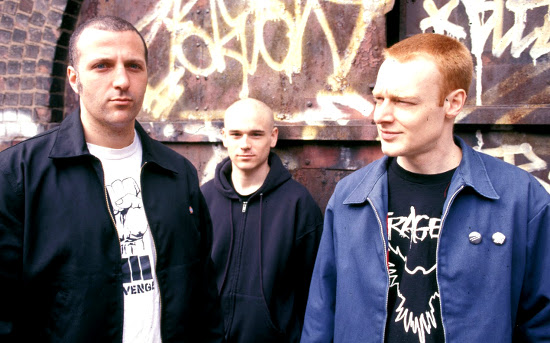
Dean Baltulonis was filling in when Ayal left, so we still had the two-guitar format. We had a string of shows up in Canada booked so we had to ship out early in the morning. It was back in the days when you could present a fake recording contract at the border outlining this plan to do a record at some fake studio in Canada and the border cops would let you through. Thousands of bands must have gotten across the border this way back in the '90s. When we rolled up to get Dean, he didn't answer the door. We just rolled out and did the shows as a three-piece.
Aside from [former Black Army Jacket member] Andrew Orlando playing guitar at Hellfest with us, we continued as a three-piece for the rest of the time. I feel that the three-piece version of Anodyne was the strongest incarnation of the band.
Anodyne made three studio albums, but I think the third one, Lifetime of Gray Skies, is the strongest one. There were some black metal overtones on that record, a sound you would dig deeper into later in your discography.
I got into black metal back in the Otis days. We were heading out on tour and stopped by our label's office to pick up records and we grabbed a bunch of music magazines to read in the van. I don't remember what magazine it was, but there was a piece about Norwegian black metal that went into the whole Euronymous murder, profiles on the main players in the scene, and had a ton of photos. This was like 1995, so the main bands were Burzum, Darkthrone, Emperor, and Enslaved. We tripped out on the whole thing. A couple of weeks later, we were playing a show in Gainesville... it was actually two shows, one at Utility House—one of your typical punk houses that had shows and had a bunch of band guys living there. We crashed there but were told that their roommate, John, was kind of a dick and wouldn't be into having people staying over. When I finally met John, he was a little standoff-ish but when I mentioned black metal he lit up and invited me into his room to check out his record collection. He had this huge Slayer Hell Awaits banner hanging up in his room and had vinyl copies of all of the black metal records that I had just read about!
This is a long-winded way of saying that black metal has been an influence in my music for a long time.
Thinking back on Lifetime of Gray Skies, I think that black metal vibe came from the bleakness of my mental state around the time we wrote and recorded that record. I was going through a massive breakup and my life was in turmoil. There was a lot of emotional pain around that time and I was manifesting much of that darkness in the music and lyrics I was writing.
I felt like the band was peaking at that time. Myself, Josh, and Joel were constantly rehearsing, doing gigs, and pushing the limits. I'm speaking for myself when I say this, but the band was the only positive thing I had going on in my life at the time. I think we were rehearsing like four or five days a week. I would work my job in the day, work out, go right to band practice, go home, collapse, and then do it all over again. Leaving town for tour was a treat for me—any chance to get away from my life in New York was welcome. Long tour, short tour, I'll take it.
Why did Anodyne end when it did?
I think the band just sort of ran its course. There wasn't any kind of personal drama or any real reason for us to break up beside that fact that we had done everything that we could do within the format of Anodyne, and it was time for us all to move on to different things. Josh and Joel formed Defeatist and put out a gang of really great records, and I started doing a project called Versoma with my friend Jamie Getz from Lickgoldensky.
SEE ALSO: 2015 interview with Chain Gang Grave.
Versoma also featured Greg Drudy (Saetia, Interpol) and Brad Wallace (Bucket Full of Teeth, Orchid).
Jamie asked me if I would be interested in working on a shoegaze-y band. Anodyne was still going on, so in my attempt to escape from sitting in my room alone and bumming out about my failed relationship, I agreed to do it. More time in the practice space was good for me. The original lineup included Jared Shavelson from The Hope Conspiracy on drums and Myles Karr from Books Lie on bass. It was really cool to sort of lay back and be a collaborator in a band. It was refreshing. Also, the material was really cool, sort of like hardcore kids playing My Bloody Valentine riffs.
When Anodyne broke up, I started doing what would ultimately become Versoma full-time. Back then, we were toying with a few names: The Great Northern, Matamoros, and some others that I've forgotten about. Jared and Myles ended up leaving and we got Greg and Brad Wallace on board and recorded the LP, Life During Wartime, for Robotic Empire. In retrospect, I like the record, but it was a case of too many cooks in the kitchen. I should have let Jamie do his thing, because he is way better at doing this style than I could ever be. Check out his band Gods and Queens, that's what Versoma would have been if I had just laid back a little.
We ended up doing a tour with Red Sparowes and Daughters, a few dates with Isis, and that was about it. I think all in all, we played 15 shows. It was fun, but it was primarily a stepping stone for me and Jamie to do our own things.
You briefly played in the band Disnihil with my old bandmate from Black Army Jacket, Andrew Orlando. Why didn't you continue on with them?
It was a lot of fun. Basically, Disnihil was the Anodyne rhythm section with Andrew and Tom [Clavin] playing guitar, and me doing vocals. I wish we had recorded something with that lineup. Leaving the band was more of a creative decision. I wanted to focus on other things. I got the feeling that Andrew and Tom were trying to make the band more of a priority and I couldn't really commit to it being more than a side project.
2007 saw you form Tombs, your most successful band yet. Your sound has evolved so much from the early recordings to today, but what did you have in mind—stylistically speaking—when you started Tombs? I remember when I first heard the first album (Winter Hours), I described it to a friend as "mean sounding."
A lot of those early Tombs riffs were unused jams that I was planning to use for Versoma. I literally started Tombs the day after Versoma broke up. The drummer I was working with in the early days of Tombs had joined Versoma, so we were already working on music together. I wanted to do something dark and emotional with an aggressive edge to it. I also wanted to embrace a more European sound—biting from bands like Breach, various black metal bands, and Godflesh.
Around this time you contributed vocals to an album by a band called Constants, which featured members of Junius. Justin Broadrick (Godflesh, Jesu, Napalm Death) was part of those sessions. What was it like working with him? I know you're a longtime fan of his.
Justin mixed the record. Will Benoit, the guitarist and sort of main man in that band, tracked the whole thing. I drove up to Connecticut and he recorded me in their studio. I never actually worked with Justin Broadrick.
Ah, I didn't know that! Okay, let's go back to Tombs. You produced Winter Hours, but then you brought in John Congleton—a producer/engineer who has worked with everyone from David Byrne to Clinic to This Will Destroy You—to oversee the Path of Totality album. Was bringing in someone with such a diverse résumé a conscious move by you to mix things up, so to speak?
Congleton is a tremendous talent. The work he did with Baroness is what really hooked us in. I met him in Dallas when we were on tour with Isis. [Baroness guitarist/vocalist] John Baizley hit me up about getting on the guest list and he brought Congleton along.
In 2014, you released Savage Gold, Tombs' third album. For that one, you worked with producer Erik Rutan, a musician I've admired since his days in Ripping Corpse. Did you hire him for a very specific reason, or was it based more on going with someone more steeped in heavy metal than John Congleton?
Though Congleton did a great job on Path of Totality, the record lacked a "metal" sound. My only issue with the past recordings was that there was too much atmosphere and less relentless brutality. I wanted a record that could sonically stand up next to bands like Goatwhore, Gorgoroth, and Morbid Angel. Rutan was the obvious choice.
SEE ALSO: On Suffering Remembered: Rorschach's Needlepack 25th Anniversary
You guys got excellent reviews from the press from the get-go, but Savage Gold was especially celebrated, even in non-metal publications. I was curious to see if that kind of critical acclaim brought in a new type of crowd to your shows.
I don't know. Doing tours and getting in people's faces is what gets you fans. The press trip... it's all fake. You can get great reviews and have all of these bloggers writing about you, but it doesn't get people out to the shows. The only thing that works is touring and crushing people.
All Empires Fall is your latest release, and it includes a couple of tracks that might be my favorite material from Tombs yet. What did each person in the current lineup of the band bring to the table?
The most significant addition is Fade Kainer. I've wanted to work with Fade for a long time. I've admired his work and it's great to finally be making music together. In the past, I've tried to integrate electronics and noise into our music to varying degrees of success. Fade is a specialist in this area, so it opens up a whole new avenue for us.
The third track on the EP, "Last Days of Sunlight," is going to throw some of Tombs' more metal-leaning fans for a loop. It sounds like something that could have come out on 4AD, circa 1987.
That song is the manifestation of many years of work. Creating a song like this has been a goal of mine, but I haven't had the ability to actualize it. I feel like we definitely paved some new ground with it and added another dimension to the Tombs sound. I think that "Last Days of Sunlight" shouldn't really be a surprise to anyone. On Savage Gold we had "Deathtripper," which has kind of a 4AD vibe to it. Definitely expect more material like this in the future.
Have you written the fourth album yet? What can we expect in terms of the stylistic turns you'll be taking on the material?
We have one new song which we rolled out on the tour with 1349. We have a ton of unrefined ideas that are slowly forming into songs that will appear on the next record. I can say that the record will be like All Empires Fall on performance-enhancing drugs [laughs].
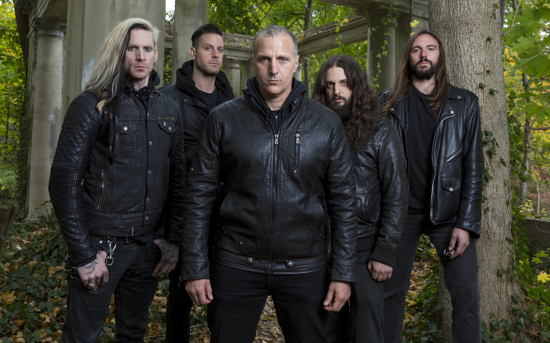
I've never been a big coffee drinker, but I recently began to really get into cold brews. How would you describe Savage Gold Coffee to someone who isn't well-versed on coffee?
Well, we have three different roasts—Prime, Dark, and Blue Monday—which all taste different. The Prime is from Ethiopia, the Dark is Kenyan, and the Blue Monday is Peruvian. There's something for everyone! If you like lighter roasts, you can go with Prime, and if you like the darker profiles, you can check out the Dark and Blue Monday. For what it's worth, the Blue Monday is my favorite. The one constant is attention to quality. If I'm selling it, I'm drinking it.
What is the toughest part about running Savage Gold Coffee?
Like most small, start-up businesses, the hardest part is promotion. I've been doing the company for about a year and a half, but I still run into people at shows that have no idea that it exists.
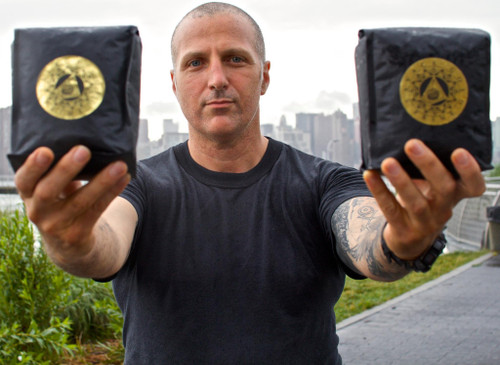
Something else you're passionate about is Muay Thai. When did you start practicing that, and why do you think it drew you in?
I've been training for about six years at this point. I also train Brazilian Jiu-Jitsu. Before Muay Thai, I trained in Tae Kwon Do for many years. I've always been a big proponent of fitness, and Muay Thai is one of the best workouts you can get. Aside from the physical benefits, I enjoy the mental side of the martial arts lifestyle. There is a certain meditative characteristic that comes out of the flow of drilling, hitting pads, or sparring. You are 100% in the moment and it releases all of the bullshit that has built up during the day. I feel very close to the guys I train with. There aren't any egos and everyone is supportive, we all want each other to succeed, to do better. That is nothing like the music world, where sometimes I feel like people are waiting for you to fail.
You have a very intense presence on stage, and—at times—off stage. Do you think you come off as intimidating to people who don't know you? If so, is that something you are comfortable with?
I can understand if people feel intimidated, but that is something they should work on. It's not my intention to make anyone feel uncomfortable, but maybe if you feel intimidated you should look inward and find out why you feel that way. There are way more intimidating people than me out there that probably get off on that trip. I'm into compassion and understanding.
Okay, to finish this monster, I have to ask you: Slapshot or Agnostic Front?
Black Flag.
***
Tombs' All Empires Fall EP will arrive on April 1 via Relapse Records, and can be pre-ordered here.

